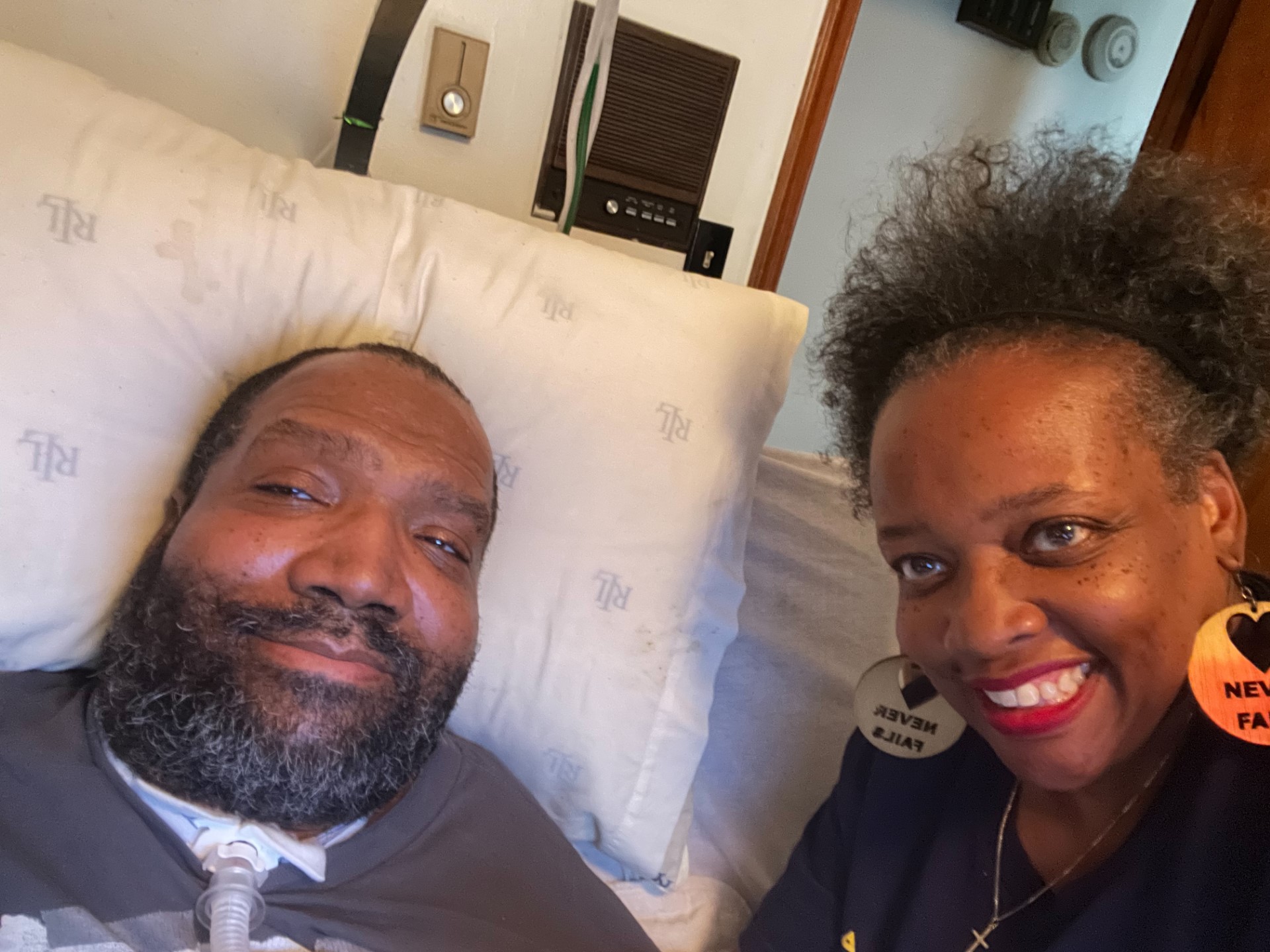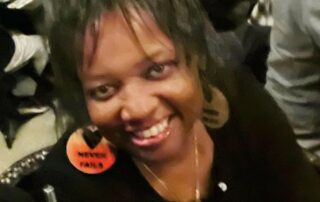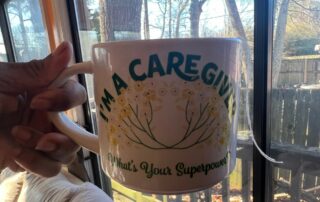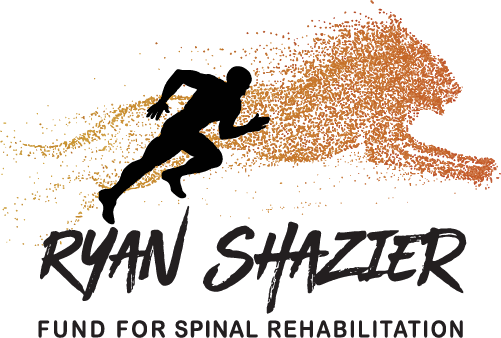A random shooting left her younger brother a quadriplegic. The bond that formed between them has kept them both thriving
For I know the plans I have for you,” declares the Lord, “plans to prosper you and not to harm you, plans to give you hope and a future.”– Jeremiah 29:11
Faith is fundamental for Sheila Johnson and Kevin McCain. “One day, he told me has read the entire Bible; BBE (Best Brother Ever) is amazing!” squeals Sheila. “We both start our day with Scripture.”
If you tend towards the spiritual, it stands to reason that the duo emphasizes faith during their daily lives.
Sheila Johnson became a part-time caregiver to her brother, Kevin, six years her junior, in 1994. “I call him “BBE–for Best Brother Ever–because for me, even 29 years later, he really is the best.”
Kevin was only 21 when an unknown assailant shot him. “He was sitting in a car, minding his business, and was shot.”
Kevin McCain’s injury is at the cervical C2/C3 level and has rendered him a total quadriplegic. “He can shrug his shoulders, and he can talk, but he needs a ventilator part-time and total care otherwise,” admits Sheila.
In 1994, Sheila worked in the corporate world, mainly as a database analyst and in IT support. Kevin, once discharged from the requisite hospitalization and rehab, moved back in with his parents.
“He lived there for years, and every day I would go to their home after work,” says Sheila, taking over the caregiving needs Kevin required that were not covered by the minimal amount of nursing care provided.
“Jesus looked at them and said, “With man, this is impossible, but with God all things are possible.” Matthew 19:26
However, their mother had MS. “My mother was declining right when Kevin got shot, so I was going over there after work, caring for my mom, dad and Kevin.”
The Johnson’s mother passed away in 2000, and their father followed 15 years later. “It was at that point–in 2016–that Kevin moved into my home.”
Sheila emphasizes that the emotional transition for brother and sister was not difficult; their faith carried them through.
It was then that the above verse came into play for the Johnsons. Sheila had to leave the business world she loved and devote herself to becoming the best caregiver to her “BBE.”
“You know,” she muses, “I look back, and I wouldn’t have it any other way. Every morning Kevin greets me with a smile. He asks, ‘How did you sleep? Do you feel ok?’”
Throughout their time together, she emphasizes the love and care the pair have for one another. “Oh, sure, there is still good-natured brother/sister kidding around,” she says, “and of course, we can get on each other’s nerves at times–but that’s rare.”
Learn as you go
Sheila Johnson has been caregiving for 29 years—most of her adult life. Did she have any training?
“Well, in a word, ‘no,’” she quips. She learned by doing and by being adept and agile enough to pick up the habits and traits of the few nurses and licensed practical nurses (LPNs) that were sent their way.
“I am self-taught,” says Sheila, an air of pride creeping into her humble countenance. “I had to figure it all out myself.”
Admittedly, caregiver resources have increased during the 29 years Sheila and Kevin have been in the trenches. Thirty years ago, there was little focus on caregivers, says Sheila. The focus was on “placement.”
“If I can say it this way,” she says, “I didn’t want my vibrant, 21-year-old brother going to a facility, you know?”
So, while her parents were still living, Kevin lived with them, and Sheila filled the night and weekend gaps.
Drop in Hours
During that time, in 1994, the Johnsons were receiving 112 nursing hours a week. Someone needing round-the-clock care requires 168 hours a week. Sheila picked up the extra 56 hours.
And when her parents both passed away, Sheila and Kevin decided that she would become his primary caregiver.
“I know him best!” she laughed, “And he trusts me the most!” To give herself some autonomy, Sheila started a bakery. “Oh, girl, I was good at it,” she laughs, “but I was too good!” She soon learned she was again burning the candle at both ends and now only bakes for specific clients.
Sheila’s “spare time” focus has been finding nursing care that she and Kevin can trust. Since his movement is limited to his shoulders, she finds many prospective caregivers reluctant to put in the physical work required to give Kevin the quality of life he deserves. But since Kevin has no spouse or children, the caregiver needs to be confident enough to care for Kevin on their own.
“I have been through several interviews,” sighs Sheila. And without saying it, the dejection creeps into her voice as she describes the roadblocks that potential caregivers bring up that preclude the hiring process.
A Dearth of Caregivers
As time went on, Sheila opines, the quantity and quality of at-home caregivers dwindled until she faced the stark reality that she was the best fit for the job.
Sheila and Kevin keep interviewing for the home health aide position.
“I did interview somebody on a meet and greet a couple of weeks ago,” explains Sheila. Suffice it to say that she wouldn’t “kiss ‘n tell,” but “Kevin and I do have standards, and those standards were being ignored.”
Kevin, though being paralyzed from the shoulders down, is not a hard case, says Sheila.
“Once you understand our standards and understand that even though this is home care it is work, I’ve still had people come in (to interview) in their pajamas and want to tell me how they would run things,” says a dejected Sheila.
She feels people don’t want to work under hospital standards, and she gets that, but what she thinks is that most people think her standards will be less stringent because its “home health care.”
“You have to work,” imparts Sheila. “I mean, it’s not for you to sit on your phone or things of that nature,” she says. “So, I’ve had people come in pajamas. I’ve had people come in hair bonnets. I’ve had people who did not want to do things with his ventilator, and, you know, with his level of injury, he has a ventilator here. He doesn’t stay on it all the time. But some home health care agencies have told me that some nurses don’t like to work with vent patients, which I do because, I mean, it’s not like he was going to be coding every day.”
The home health workers that Sheila has encountered know they can pick and choose what job they accept because there will always be some workers needed somewhere.
There is no ctrl/alt/del function
“With Kevin,” says Sheila, a tinge of frustration creeping into her voice; “he’s a human being, with feelings, wants, desires. If we make a mistake, there is no ctrl/alt/del buttons to push to make things go back to the way they were before….”
Kevin Johnson is a survivor; a human being with a personality and with feelings and with wants and needs.
And he also knows what can and cannot be done to facilitate his best outcomes.
We’re Not Broken
“Kevin knows his healthcare inside and out,” says Sheila, “We’re not broken. We don’t need to be fixed. We need some help.”
Another of Kevin and Sheila’s frustrations center around the fact that Kevin “doesn’t exist” in the conversation. “I had one woman tell me what she’d do with him, and I finally had to say, ‘Talk to Kevin! He’s right here!’”
Sheila explains Kevin knows his needs and wants, is open to suggestions, and is articulate. It’s disheartening when he is not included in the conversation.
Kevin and Sheila cannot estimate the number of caregivers they’ve had—“Oh, girl, too many to count!” says Sheila with an easy laugh.
They have one retired nurse that still comes, and Sheila pays out of pocket because that nurse and Kevin have an exceptional relationship.
“And I tell people this, not just because he’s my brother, but because he has an excellent demeanor to be in the position that he’s in his life.”
In the end, Kevin and Sheila epitomize the state of caregiving in the disability world when a resourceful family member commits to caring for their relative or friend.
For Sheila and Kevin, their faith has carried them through many dark storms and sunny days. For those who have given their life to their family, like Sheila Johnson, The Fund sees you.
Our Caregivers Portal is made possible through the generous support of the Edgar Snyder and Associates Foundation.

Shalieve
Wisdom

Sheila’s Self-Care
For a while, Sheila Johnson owned a bakery to keep her creative juices flowing and to give her something to do outside of the home.
But the deadline demands became too great, and once again, she turned to her other talents: blogging, journaling, and social media. She works on projects locally, and she, Kevin, and their uncle invented a three-tiered cupholder specifically designed for quadrapaegics.
“I think I need to go on Shark Tank with that one!” quips Sheila.
As a fellow Shark Tank devotee, we’d tune in for that episode!





